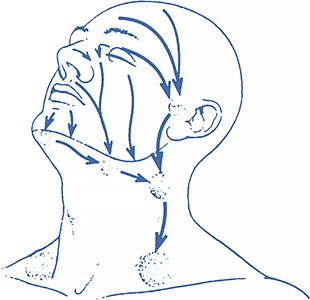EVALUATION & MANAGEMENT OF HEAD & NECK LYMPHEDEMA
COURSE OVERVIEW
Head and Neck Lymphedema (HNL) is a devastating condition that frequently follows surgery or radiation for the treatment of head and neck cancer. Not only can HNL affect the patient's communication and swallowing function, but in severe cases can affect respiration, vision, and even ambulation, not to mention the frustration and embarrassment that accompanies this disfiguring condition. However, with proper treatment, HNL can typically be reduced to a manageable level. This 2½ day workshop will provide the academic foundation and practical application for the therapist to successfully implement basic techniques to reduce the edema that can create such devastating impairments. Therapists will learn about: (1) the basic lymphatic system; (2) evaluation and measurement; (3) Manual Lymph drainage (MLD); (4) compression wraps and garments; (5) documentation and billing
CURRICULUM OBJECTIVES
- Explain the basic anatomy and physiology of the head and neck lymphatic and venous systems and identify the relevant structures involved in lymphatic drainage.
- Identify the most common forms of head and neck cancer, their treatments and side effects, and their functional impact on communication and swallowing.
- List the various causes of edema in the head and neck and their appropriate treatments.
- Differentiate between typical post-operative edema and lymphedema involving the head and neck.
- Describe the effects of head and neck lymphedema on communication, swallowing, and psychosocial processes.
- Demonstrate basic proficiency in assessment and development of a basic treatment plan for a patient with head and neck edema.
- Demonstrate proficiency in basic techniques to reduce edema of the head and neck in order to improve communication and swallowing. These include:
- Manual Lymph Drainage (MLD) techniques
- compression wrapping for the head and neck
- Kinesiotaping of the head and neck
- Evaluate a written case study for a patient with head and neck lymphedema and perform an appropriate treatment session for that patient.
Professionals eligible to attend the course include both Certified Lymphedema Therapists (CLTs) and Speech-Language Pathologists (SLPs) who treat head and neck cancer patients. The course will include a basic review of lymphatic anatomy and physiology as well as basic MLD techniques relevant to the head and neck. Emphasis will be placed on the performance of basic techniques required for management of the patient with head and neck lymphedema and will be presented in a fashion that will accommodate the learning needs of both groups.
INSTRUCTORS
Laurie J. Wennerholm MA, CCC-SLP, BCS-S, is a clinical specialist in swallowing disorders with over 26 years of experience, focuses on speech, voice, and swallowing impairments in head and neck cancer patients at NYU Langone Health. She teaches Dysphagia at New York University and mentors students, while also conducting research to improve care pathways for laryngectomy patients. Laurie is dedicated to providing evidence-based, optimal care to maximize her patients' quality of life. Disclosure: Financial – Laurie J. Wennerholm is a paid instructor for the Norton School of Lymphatic Therapy. Non-financial - There are no relevant non-financial relationships to disclose.
CONTINUING EDUCATION UNITS (CEUs)
CEUs for CLTs are provided through the FPTA, and NCBTMB. For SLPs this course is offered for 2.0 ASHA CEUs (20 hours).
AOTA Approved Provider CE; AOTA Approved Provider of continuing education. This Distance Learning and Live blended format activity is offered at 13.5 CEUs, educational level introductory & intermediate, categories 1, 3. The assignment of AOTA CEUs does not imply endorsement of specific course content, products, or clinical procedures by AOTA or indicate AOTA approval of a certification or other professional recognition.
ELIGIBILITY & ADMISSION REQUIREMENTS
Registration is limited to CLTs who have completed a 135-hour LANA-recognized lymphedema certification program, SLPs, and MDs.
COURSE DURATION & CLASS TIMES
A total of 20 hours of instruction is provided in the Evaluation and Management of Head and Neck Lymphedema course. Class hours are Friday and Saturday 8:00am-5:30pm, and Sunday 8:00am to 12noon.
ACCESSIBILITY & SPECIAL NEEDS SUPPORT
This continuing education activity is fully accessible to special needs students and addresses the needs not only of individuals with physical impairments, but also of those with sensory impairments (e.g., hearing, speech, vision), and emotional and learning disabilities. This includes accessible technology and compliance with the Americans with Disabilities Act for distance learning. The Provider ensures an instructional environment that enhances the learning process. Resource or reference materials and instructional aids and equipment are current, appropriate for the learning activity, and support the intended learning outcomes. The Provider attempts to create a fully accessible educational environment from which all learners can benefit, and provides an opportunity for learners to identify special needs in advance of the activity.
TUITION
Tuition for the Evaluation and Management of Head and Neck Lymphedema course is $745.



